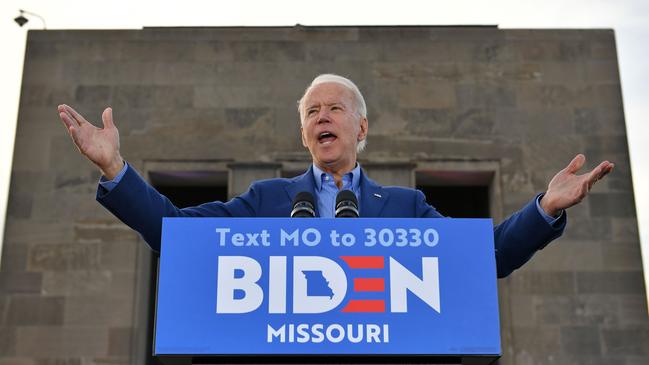Where’s Joe? Biden struggles to attract attention as he turns his home into a TV studio
Joe Biden has struggled to attract attention amid the wall-to-wall media focus on the global pandemic.

Election, what election? Ever since coronavirus turned the world upside down over the past week or so, Joe Biden has struggled to attract attention amid the wall-to-wall media focus on the global pandemic.
Suddenly, the looming November election is barely spoken of, even though the former vice- president has, in effect, defeated Bernie Sanders to be the presumptive Democratic nominee.
For the past five days, Mr Biden all but vanished from public view as he stayed in his home in Wilmington, Delaware, watching it being transformed into a television studio that will become the hub of his now-virtual campaign.
At the age of 77, Mr Biden cannot afford to catch a virus that disproportionately kills people of his age, so aides have been extra careful in limiting his own personal interactions.
Yet just when social media began to taunt Mr Biden with hashtags such as #whereisJoe, the future nominee gave a video address on Tuesday (AEDT) attacking Donald Trump’s handling of the pandemic.
The speech wasn’t without its stumbles. At one point, Mr Biden lost track of the autocue and skipped ahead.
Democrats believe Mr Biden has a strong case to portray his November opponent as having failed to provide the leadership in the initial phase of this crisis that should be expected of a US president. But with Mr Trump directing a daily prime-time press conference at the White House, Mr Biden is struggling for visibility on the issue.
“Trump keeps saying that he’s a wartime President. Well, start to act like one,” he said.
“Let me be clear: Donald Trump is not to blame for the coronavirus, but he does bear responsibility for our response. And I, along with every American, hope he steps up and starts to get this right.”
Mr Biden accused Mr Trump and his administration of a “failure of planning and preparation” that had worsened the health and economic crises the nation faced. This included a slow response to testing for the virus, as well as a shortage of essential protective equipment, including face masks and ventilators.
“For too long, the warning signs were ignored,” he said. “For too long, the administration said the threats were under control, contained, or like the flu. The President said no one saw this coming. That’s just not accurate. Our intelligence officials were warning about the coronavirus threat in January. Just based on the public information I had, I warned the threat was getting worse way back on January 27.”
Mr Biden also criticised the President for invoking the Defence Production Act, allowing the government to order businesses to create emergency supplies of masks and ventilators, but had so far declined to use the powers. “To paraphrase a frustrated president Lincoln writing to an inactive General McClellan during the Civil War, ‘if you don’t want to use the army, may I borrow it?’ ”
The Biden team is trying to work out how it should adapt to the coming presidential election campaign, which will unfold in the shadow of the pandemic. It is possible the campaign will be the first to be conducted without rallies or meet-the-people events.
“Fundamentally, campaigns are about touching people,” said Democrat strategist Jared Leopold. “The idea of a campaign without handshaking and big crowd events would be a fundamental change to the way every campaign has been run.”
Cameron Stewart is also US contributor for Sky News Australia.




To join the conversation, please log in. Don't have an account? Register
Join the conversation, you are commenting as Logout